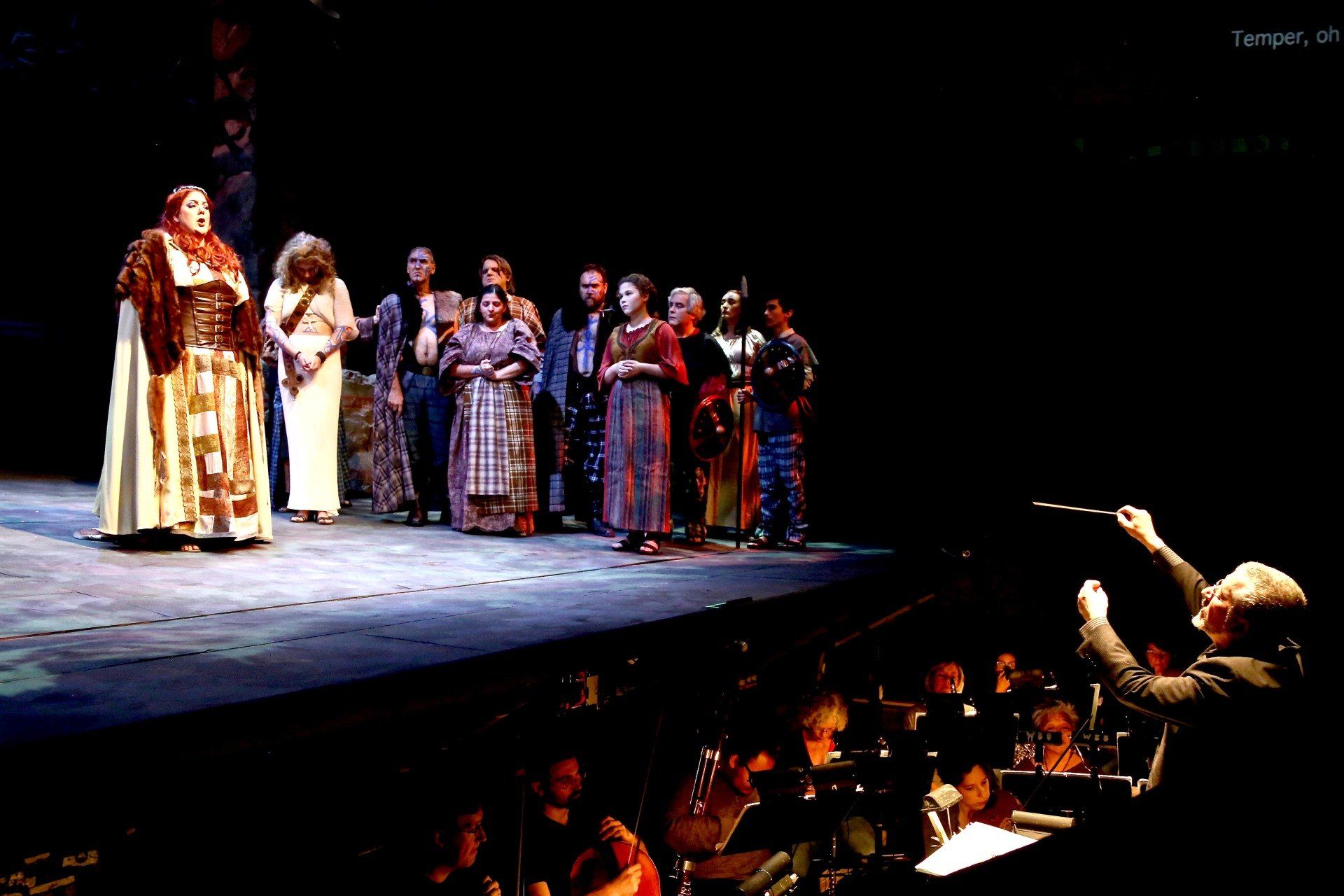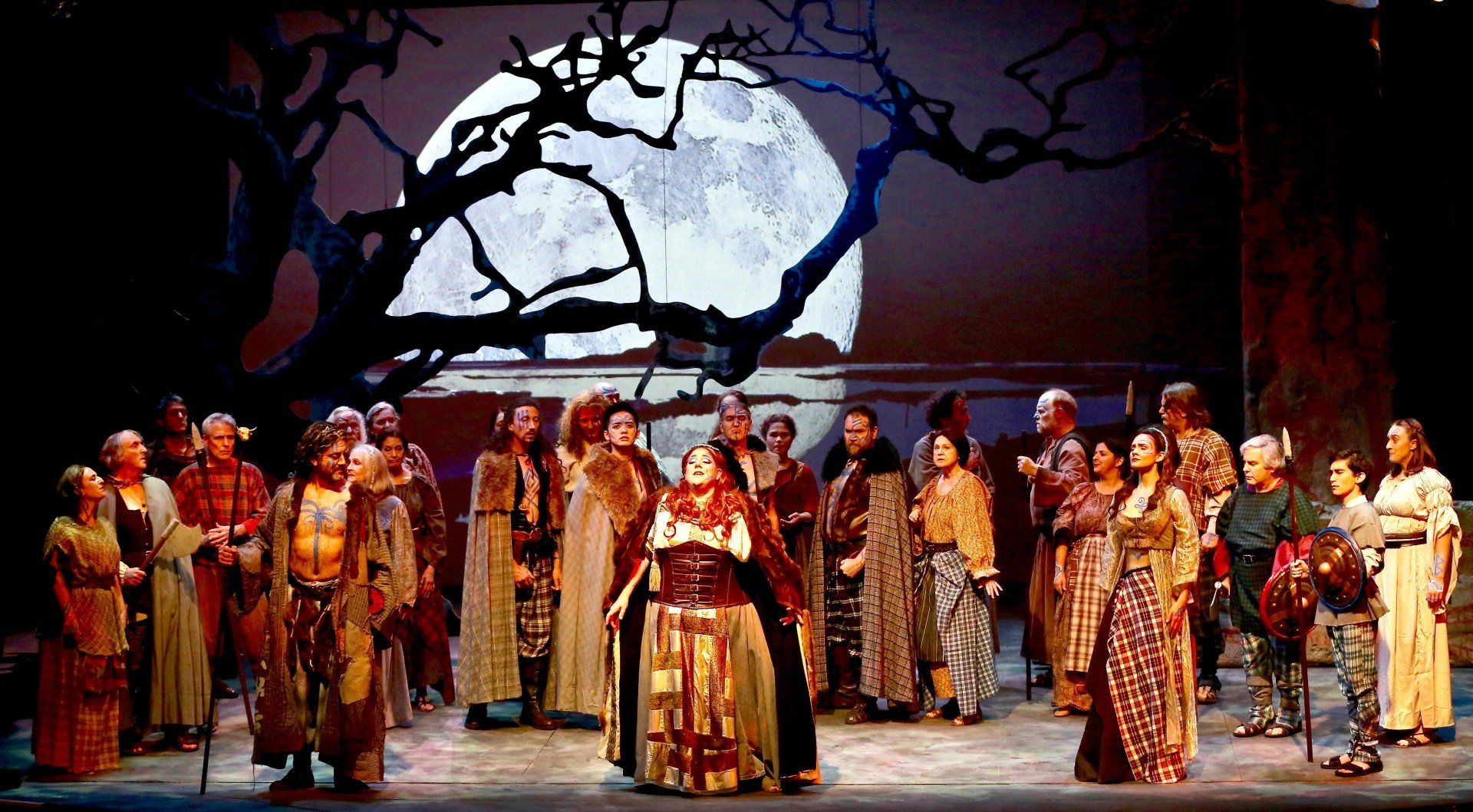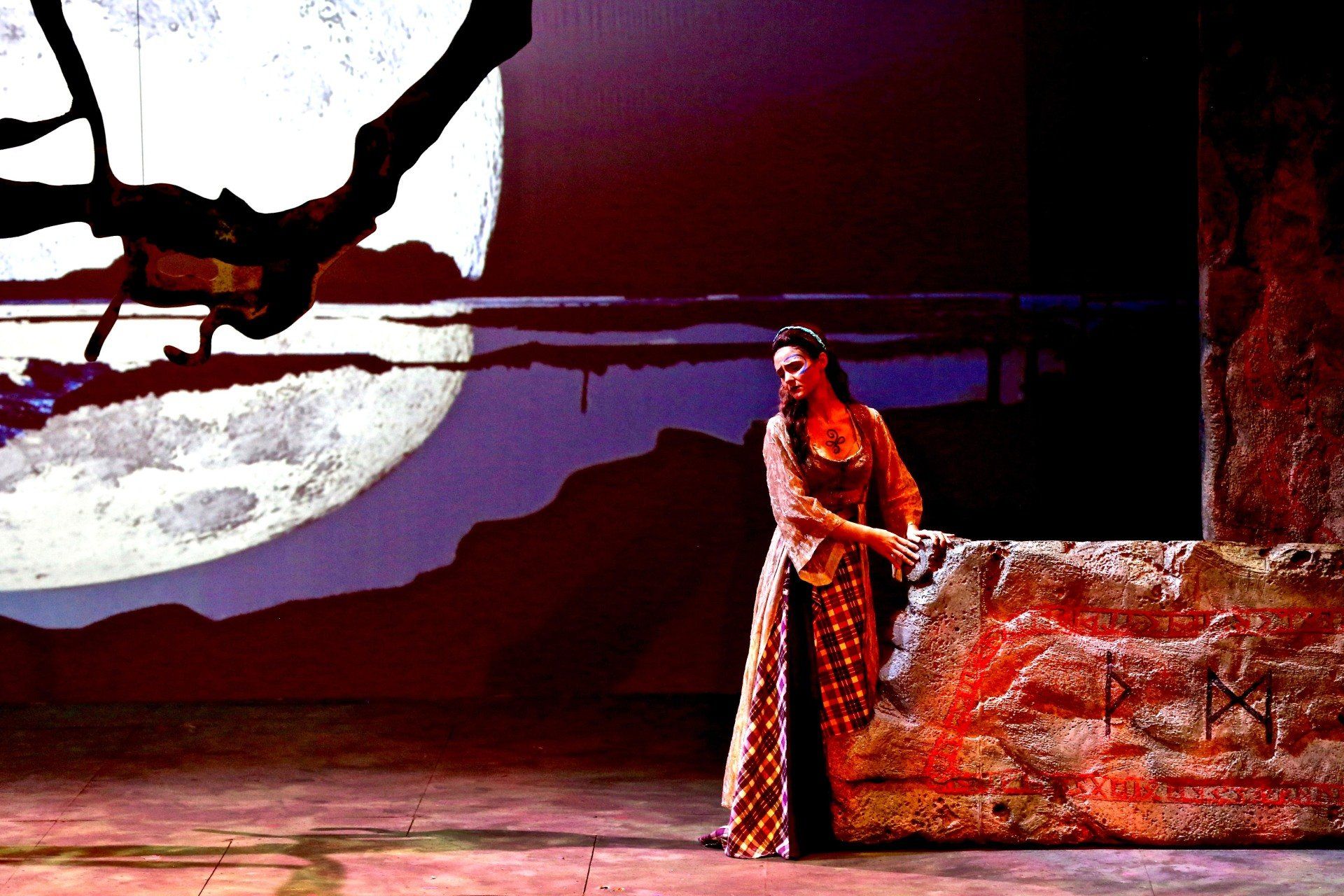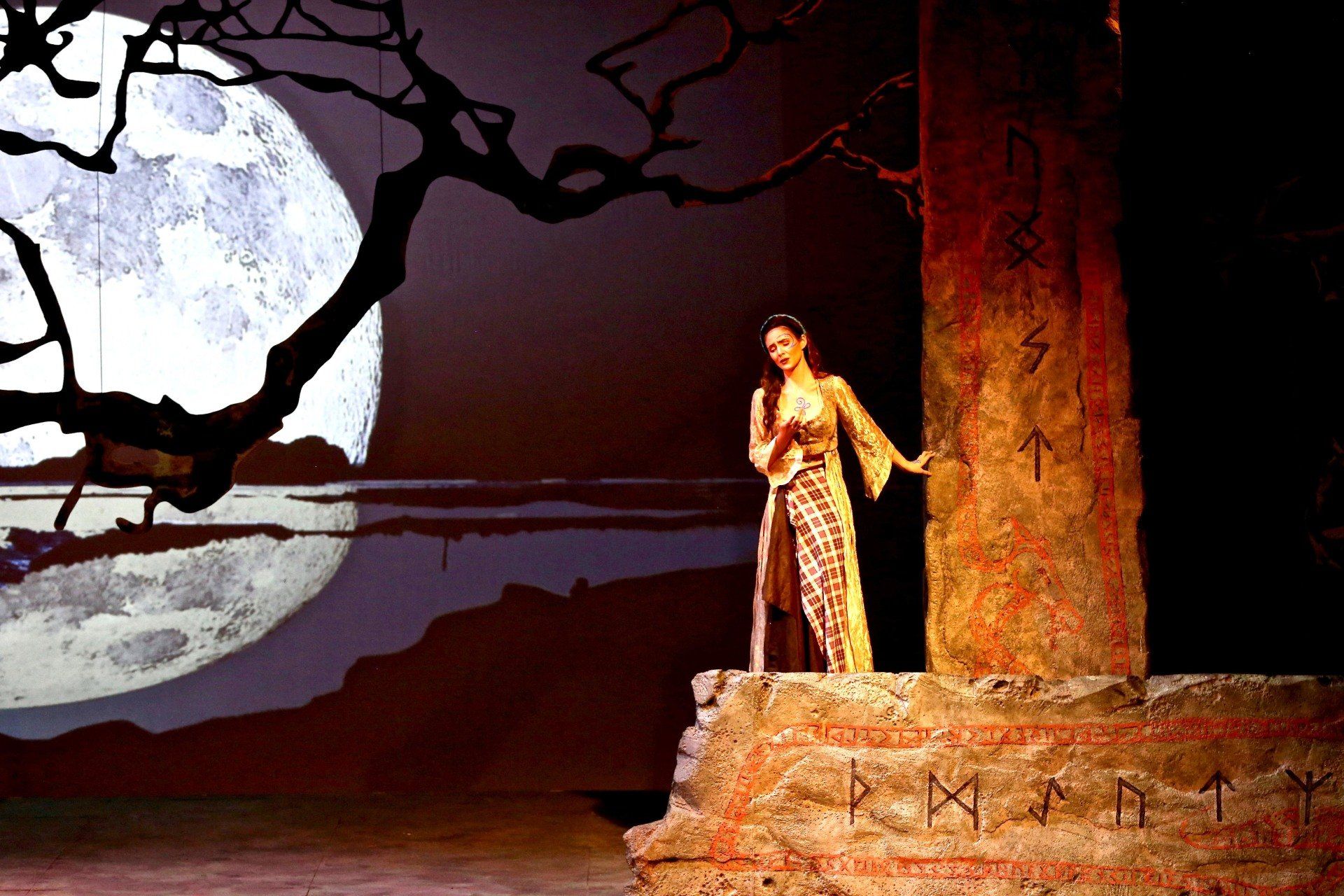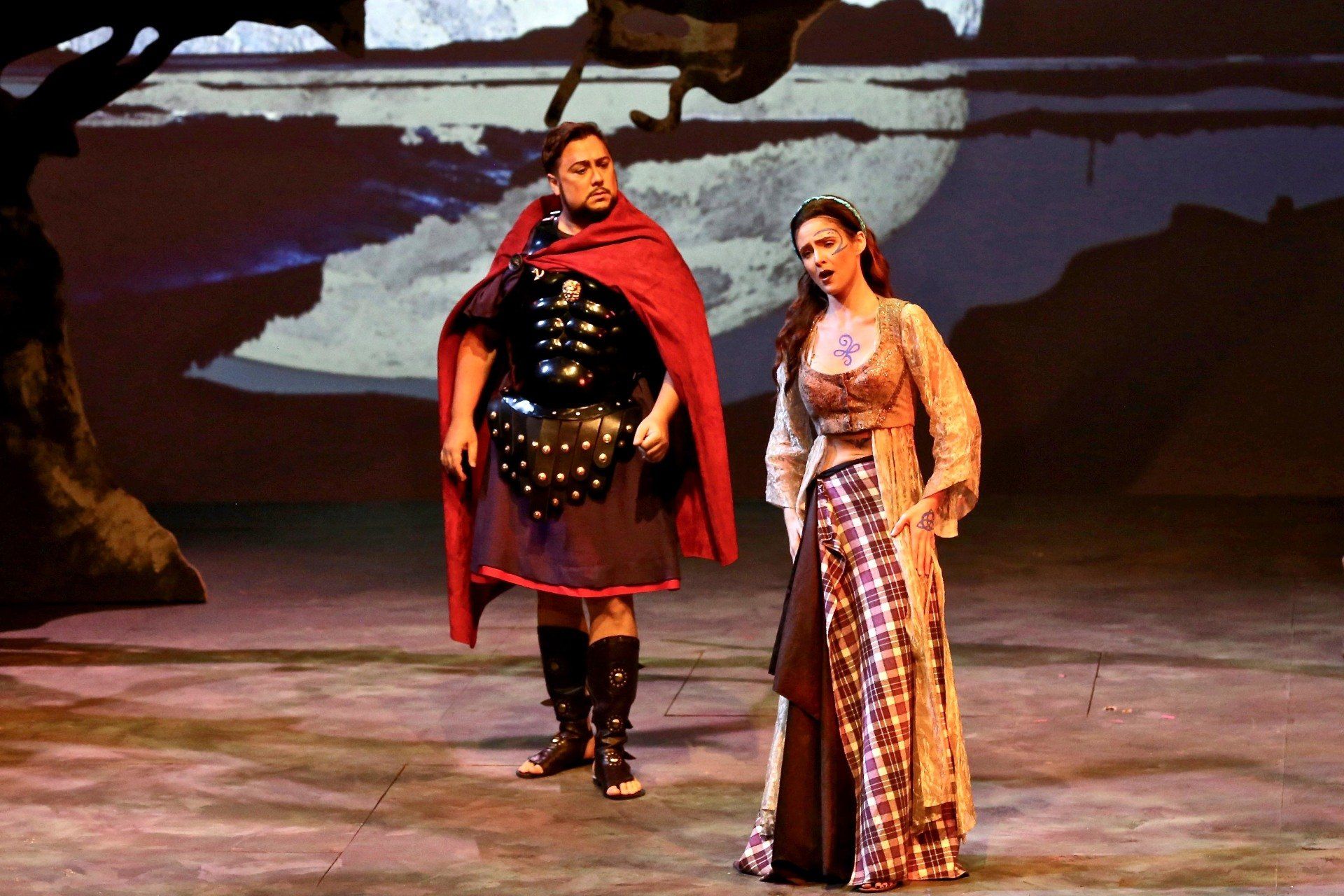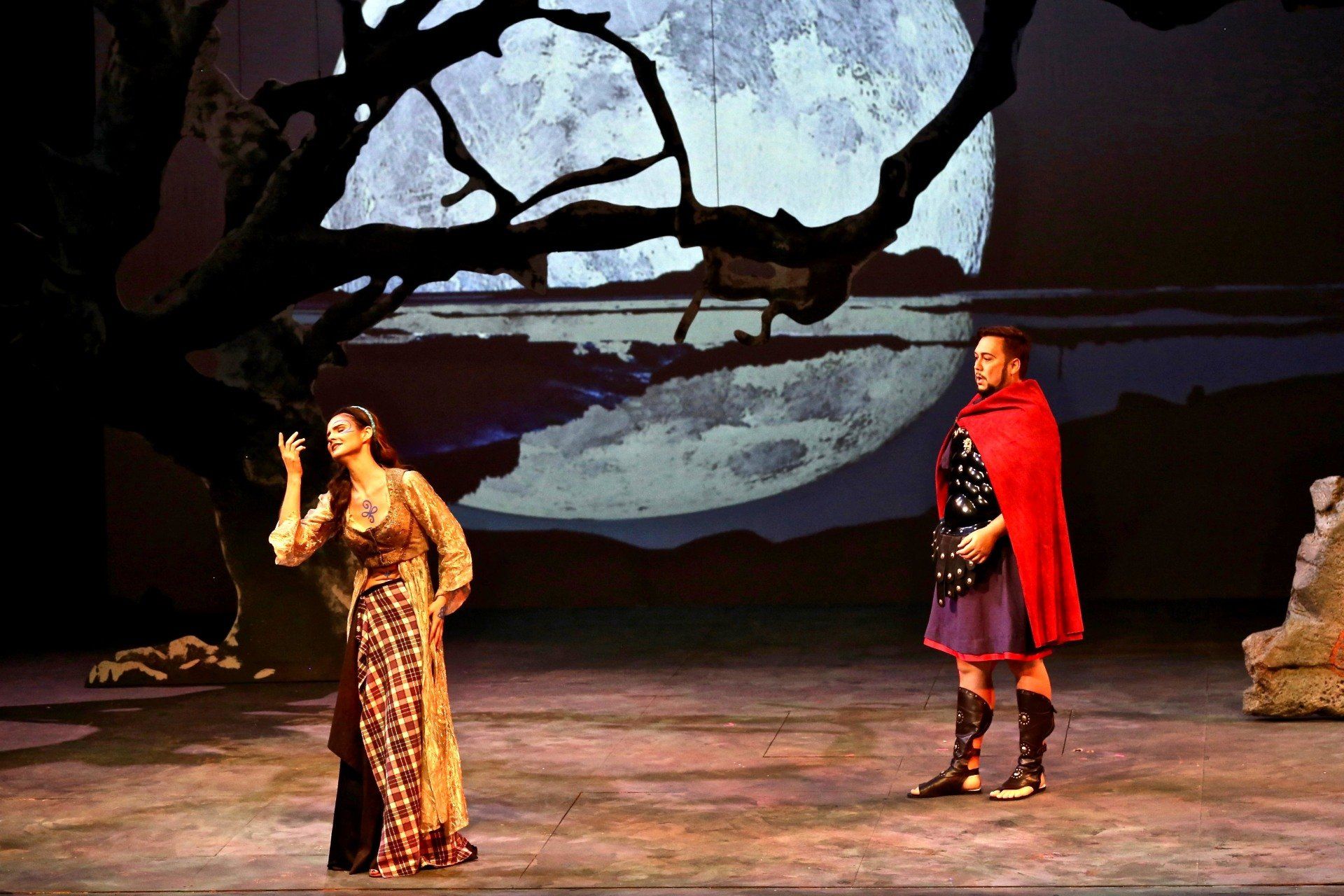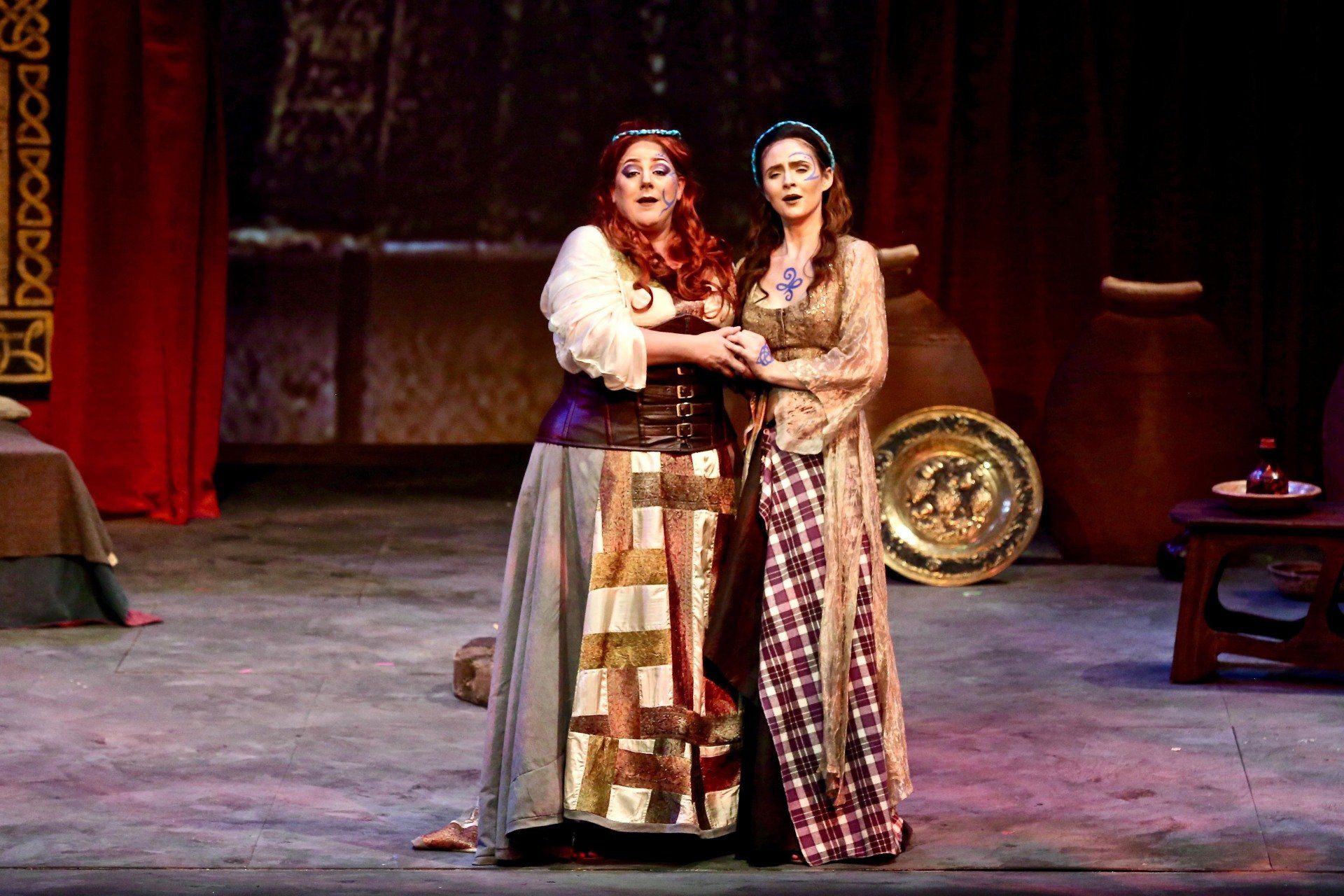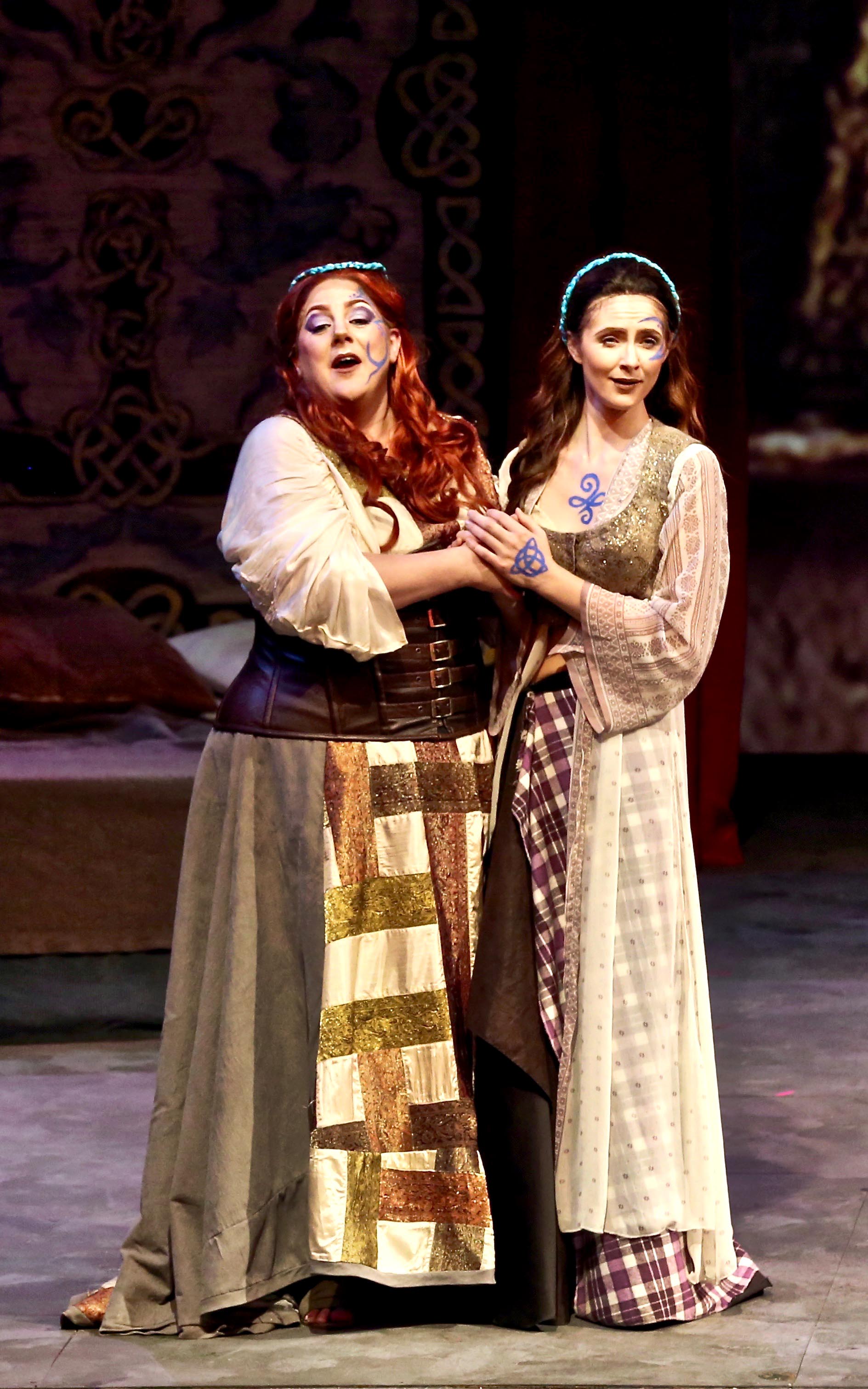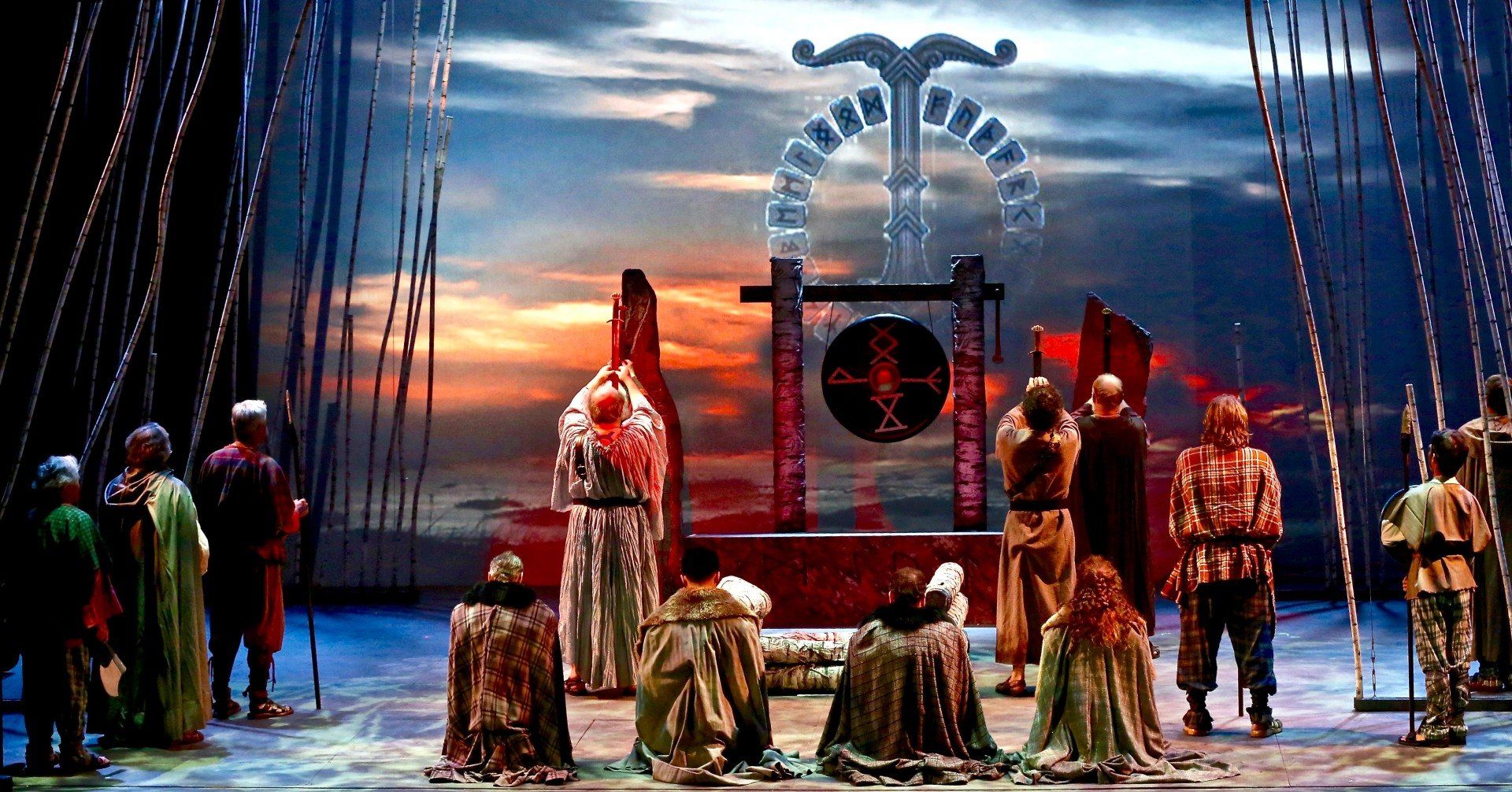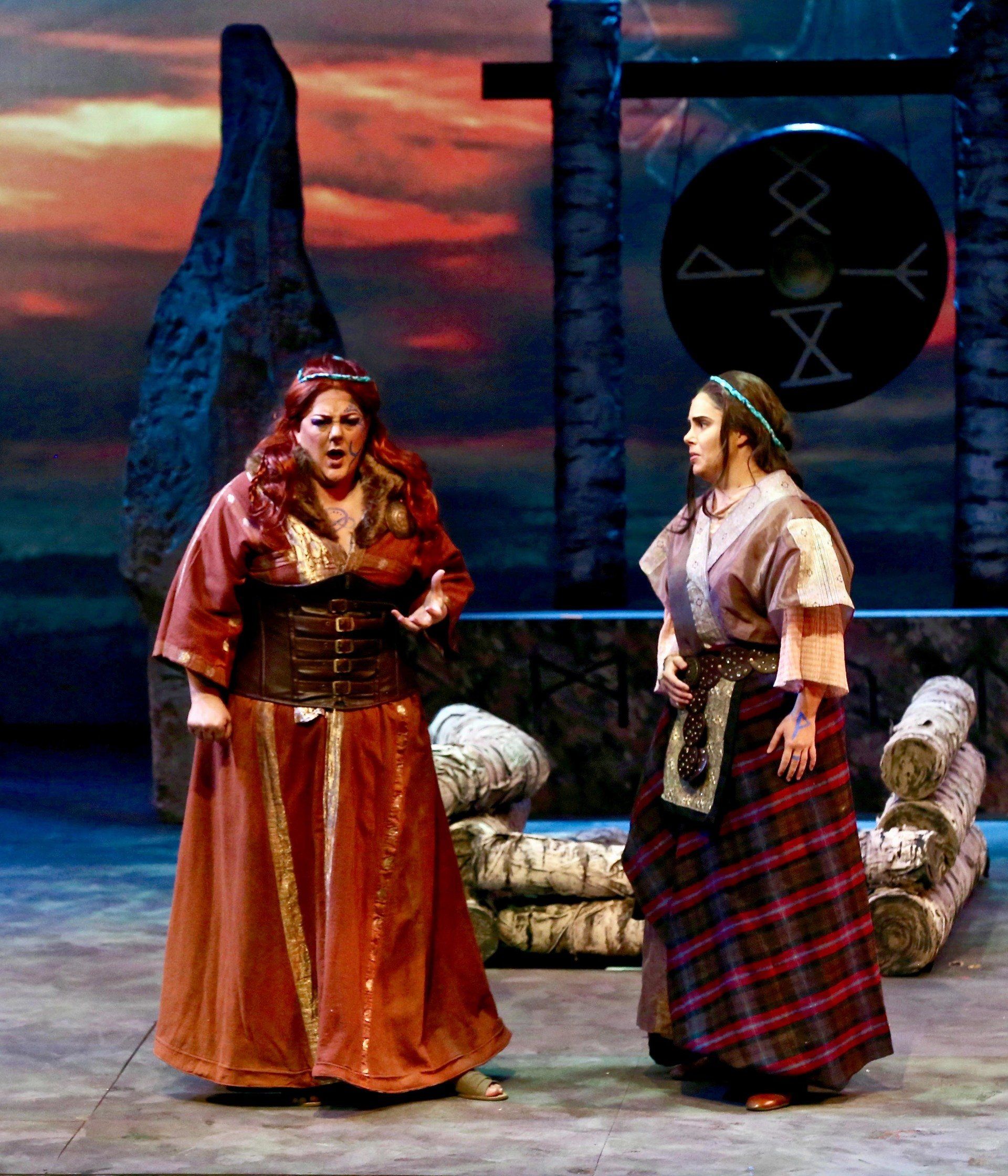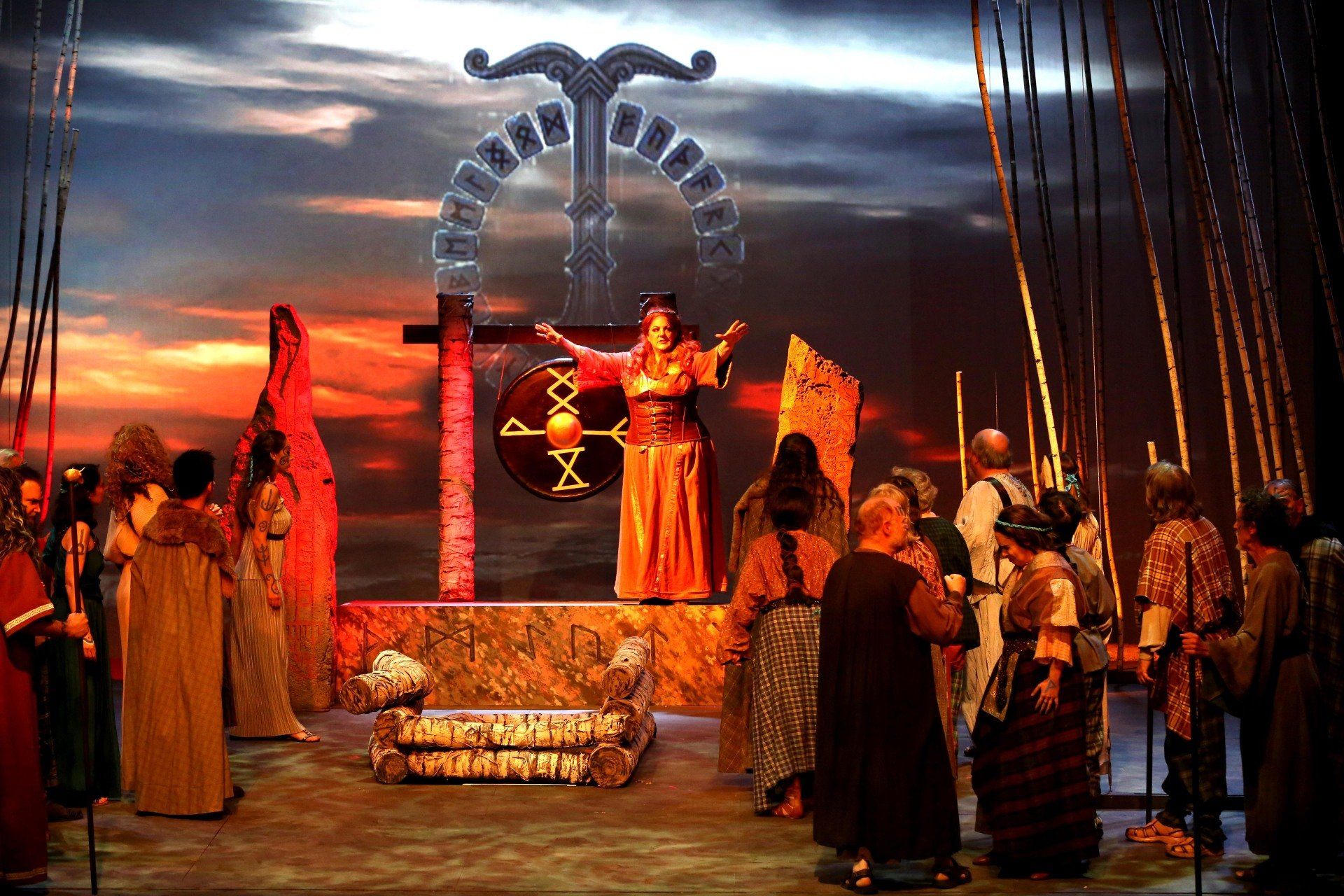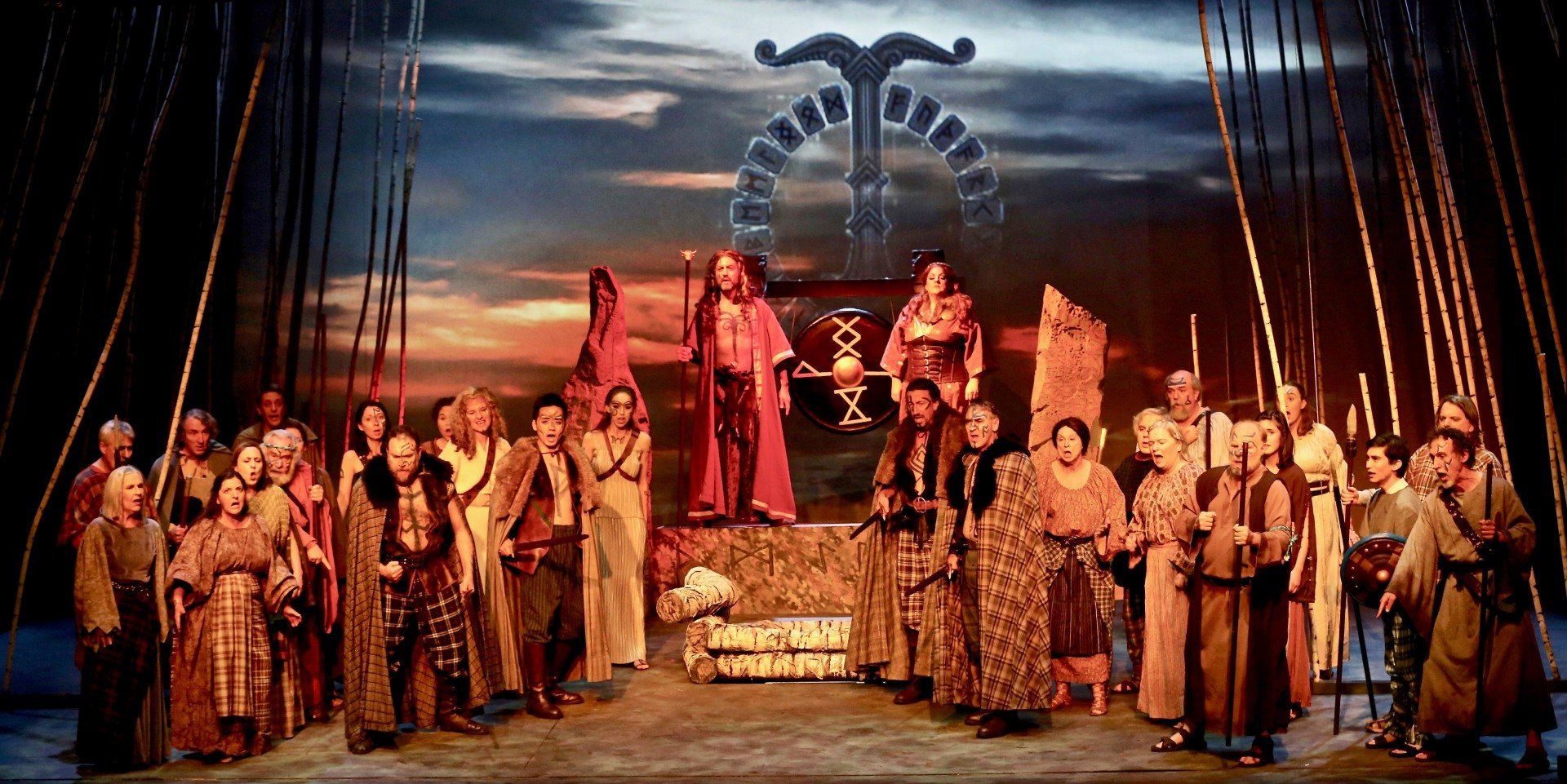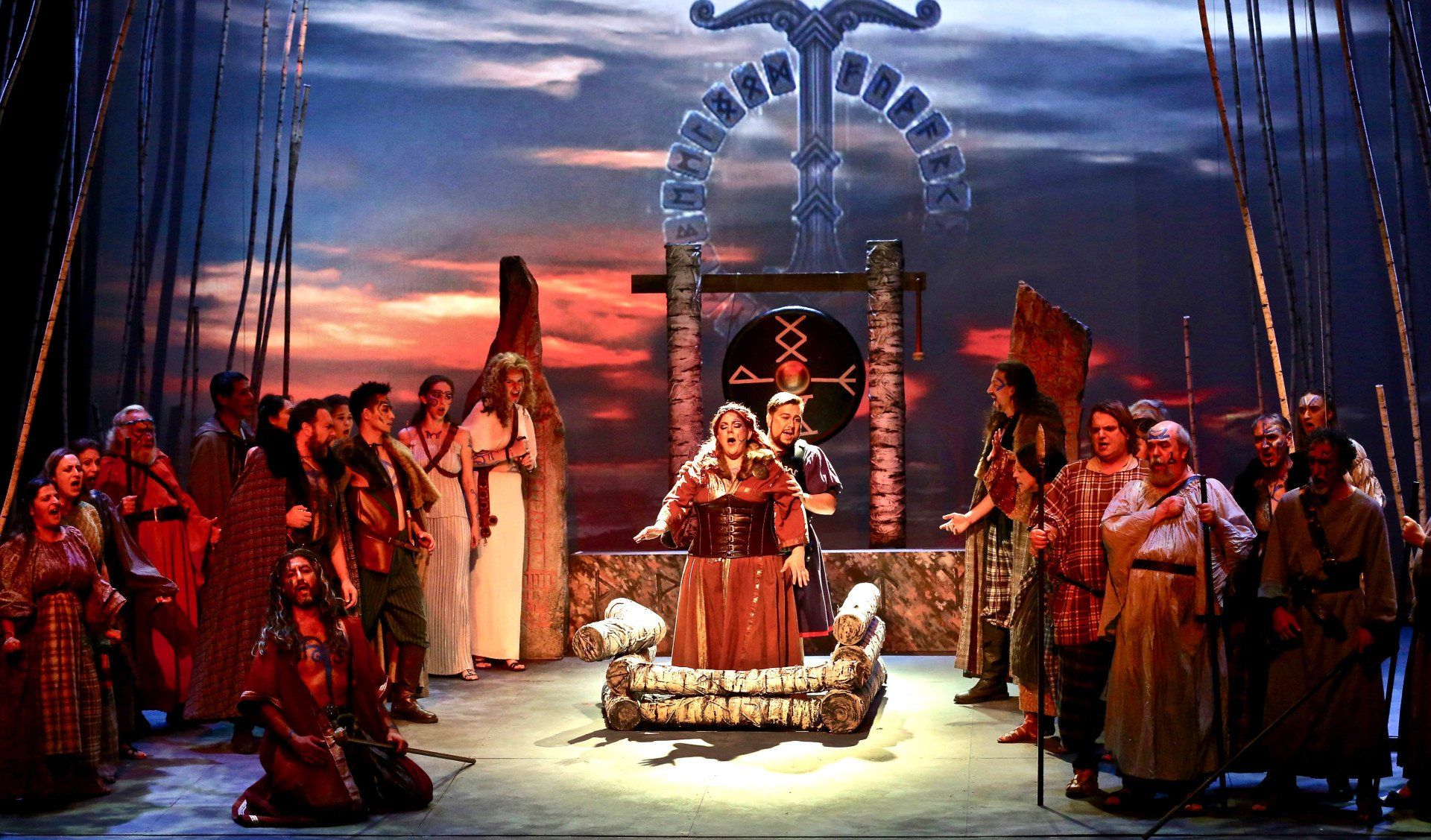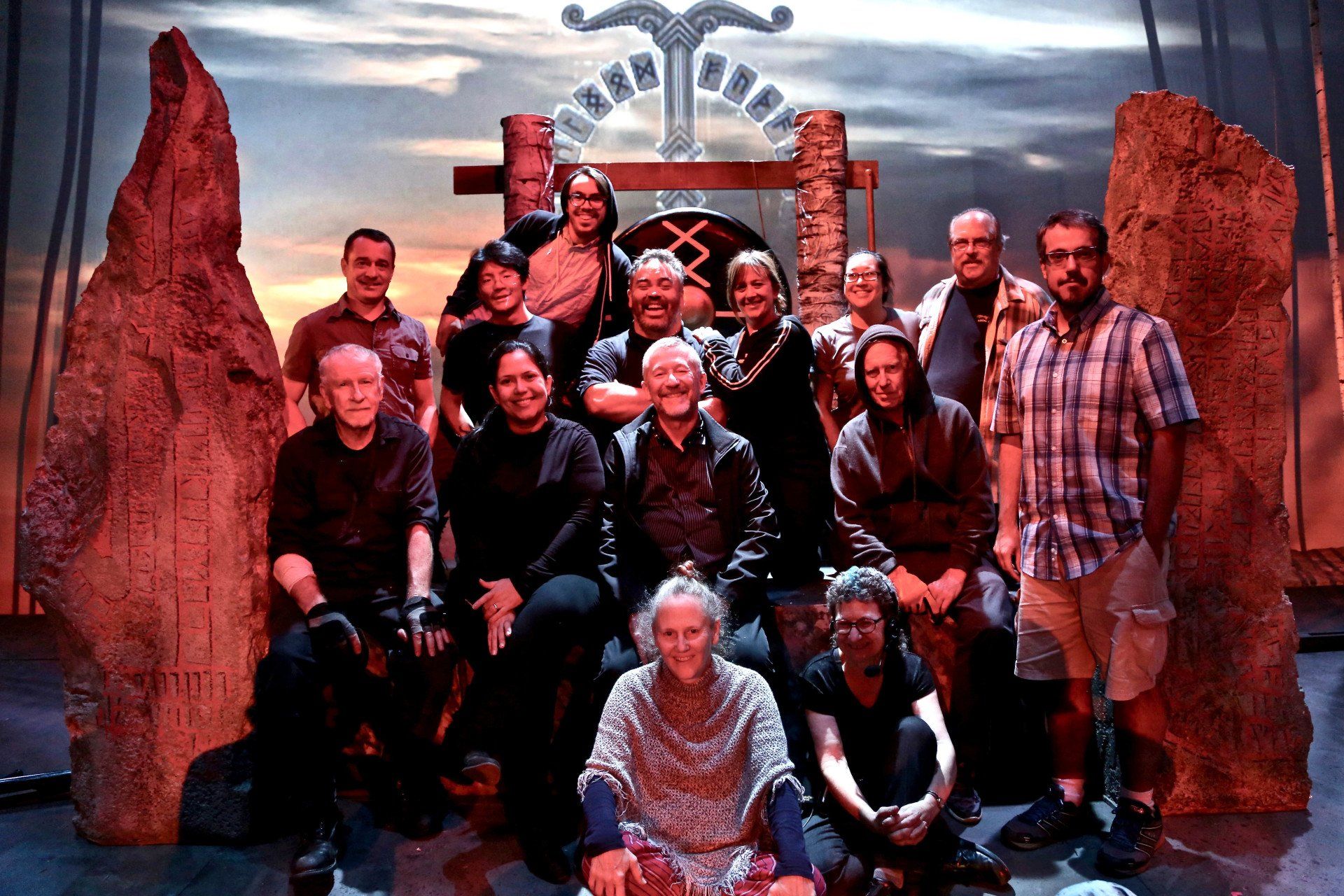Creative Team
Cast
Norma - Christina MajorPollione - Benajmin Sloman
Chorus
Hiroki Amada, Mark Baushke, Joanne Bogart, Rick Bogart, Steve Boisvert, Geordie Burdick, JoAnn Close, Sophia Gever, Inna Gitman, Michael Good, John Graham, Terry Hayes, Katherine Naegele, Mark Nelson, Joanne Newman, Erwin Oertli, Cheryl Passanisi, Maria Polyakova, Victoria Sadow, Philip Schwarz, David Simon, Michelle Skylar, Miles Spielberg, Jennisara Sumiri, Christian Voitenleitner, Diane YeramianSupernumeraries(Norma's children)Kaiyuan Ding, Darius Matulich
Orchestra
Violin I: Kristina Anderson (Concertmaster), Josepha Fath, Andrew LanViolin II: Judy Kmetko, Robin Hansen, Frida Pukhachevsky, Hazel KeelanViola: Rachel McGuire, Alessandra AquilantiCello: Evan Kahn, Hans HofferBass: Christy Crews/Marie LaskinFlute: Leslie Chin, Mary Hargrove;Oboe: Peter Lemberg, Liam BoissetClarinet: Art Austin, Sue Macy;Bassoon: Jamael SmithHorn: Susan Vollmer, Leslie HartTrumpet: Rick Leder, Chris WilhiteTrombone: Brenan Lai-TongTimpani: Don BakerPercussion: Norm PeckHarp: Randall PrattPersonnel Manager: Christy CrewsLibrarian: Virginia Smedberg
Production Staff
WEST BAY OPERA STAFF
Technical Director: David Gardner
Arts Administrator: Christopher Cha
Asst. Costume Shop Supervisor: Merna Black
Orchestra Manager: Christy Crews
Orchestra Librarian: Virginia Smedberg
Click below to see the
NORMA PRODUCTION STAFF
-
Button
Oroveso (Isaiah Muzik-Ayala) and Druid men in the forest.
-
Button
L-R: Pollione (B. Sloman) tells Flavio (Carmello Tringali) about his affair with Adalgisa.
-
Button
L to R: Norma (Christina Major) and Druid women. In the pit, maestro Moscovich and the WBO Orchestra.
-
Button
Foreground, L to R: Oroveso, Norma and Adalgisa
-
Button
Adalgisa (Veronica Jensen)
-
Button
Adalgisa (Veronica Jensen)
-
Button
Pollione (Benjamin Sloman) and Adalgisa (Veronica Jensen)
-
Button
Pollione and Adalgisa
-
Button
L to R: Norma (Christina Major), Clotilde (Katia Hayati) and Norma's children (Kaiyuan Ding and Darius Matulich)
-
Button
L to R: Norma (Christina Major) and Clotilde (Katia Hayati)
-
Button
L to R: Norma (Christina Major) and Adalgisa (Veronica Jensen)
-
Button
L to R: Norma, Adalgisa and Pollione
-
Button
L to R: Adalgisa and Norma
-
Button
L to R: Norma and Adalgisa in the duet.
-
Button
Men's chorus - Act II - Irminsul's altar in the forest
-
Button
Oroveso (Isaiah Muzik-Ayala) and the Druid fighters
-
Button
Norma (Christina Major) and Clotilde (Katia Hayati)
-
Button
Norma strikes the gong, in a call to war against the Romans.
-
Button
Center (on the altar): Oroveso (Isaiah Muzik-Ayala) and Norma (Christina Major) and the WBO Chorus.
-
Button
L to R: Norma (Christina Major), Oroveso (Isaiah Muzik-Ayala) and Pollione (Ben Sloman). Pollione has defiled the temple and Oroveso makes ready to execute him.
-
Button
Oroveso (Isaiah Muzik-Ayala) watches as Norma (Christina Major) takes over the execution of Pollione (Ben Sloman)
-
Button
Norma (Christina Major) ready to execute Pollione (Ben Sloman)
-
Button
Pollione (Ben Sloman) threatened by Norma (Christina Major)
-
Button
Norma (Christina Major) confesses her sins.
-
Button
Pollione (Ben Sloman) joins Norma (Christina Major) on the pyre.
-
Button
Norma (Christina Major) and Pollione (Ben Sloman), their love rekindled, die together on the pyre.
-
Button
Norma Production Crew. : L to R back row: JF Revon, Joshua Cha, Sean Kramer, Grady Sanders, Karen Sanders, Giselle Lee, Kevin Scholl. L to R middle row: Rudy Schroeter, Fernanda Carvalho, José Luis Moscovich, Franklin Harris, Igor Vieira. Seated in front, L to R: Shirley Benson, Judy Bogart.
- Read the review in the San Francisco Classical Voice
Passionate Music and Druidic Barbarity Emerge in West Bay Opera’s Norma
BY NICHOLAS JONES , October 17, 2017 WEST BAY OPERA
Classic opera at a reasonable cost, with excellent leads and a strong orchestra, presented in a reasonably sized hall, nestled among a lovely grove of oak trees — who could ask for anything more?
The oak grove at Palo Alto’s Lucie Stern Theater was an appropriate locale for West Bay Opera’s fall production of Bellini’s Norma, whose forceful heroine guards the sacred oaks (and dependent mistletoe) of druidic Gaul. The production, continuing this weekend, presents Bellini’s lyrical music with the fiery emotion and steely control that it demands.
If all Gaul is divided in three parts, as Caesar wrote, so too are its high priestess’s hyper-conflicted loyalties. Betraying her responsibility to her people, who are oppressed by Roman rule, Norma has for years secretly loved Pollione, the Roman proconsul, and borne him two children. But Pollione now loves another druid prestess, Adalgisa, for whom Norma is, in turns, rival, supervisor, and BFF. This love-triangle plays itself out in a tightly-woven series of revelations and reversals, and — needless to say — does not end happily.
The title role famously demands a wide vocal range and a charismatic emotional presence, as well as the technical ability to manage Bellini’s intricately crafted lines, which bristle with complicated trills, runs, and other ornaments. Soprano Christina Major, singing Norma, made it all happen. Although Bellini has little interest in character development — he tends to give Norma first one mood and then another, without any transition — Major eloquently bridged the gaps that Bellini leaves, suggesting, or at least inviting us to imagine, the heroine’s inner thoughts.
Norma’s opening recitative, her fierce denunciation of a rebellious contingent of her countrymen, flowed seamlessly into the very different aria that follows, the famous “Casta diva,” her noble and heartfelt prayer to the goddess of the moon. The sense of continuity — especially crucial for such a tragic story — was enhanced by consistently excellent playing in the pit, and sensitive conducting by José Luis Moscovich, West Bay Opera’s longtime general director.
Mezzo-soprano Veronica Jensen sang Adalgisa with a hauntingly dark viola-like timbre and extraordinary control of both pitch and tone. Jensen’s rendering of Adalgisa’s fleeting moments of confrontation — with rival and lover — were less effective than her splendid duets with Norma, in Bellini’s sensuous and powerful alternatives to the relentless tragedy of betrayal and vengeance.
The role of Pollione was sung by Benjamin Sloman, who has a fine, strong tenor voice — perhaps too strong for the small auditorium of West Bay Opera. The haughty grandeur that matched his authority as a Roman officer unfortunately left little room for sexual chemistry with either of his two lovers.
It is wonderful that West Bay Opera takes on a tremendously difficult opera like Norma and delivers it with such musical force. It would be even better if its fascinating contemporary relevance — national pride, women’s tenuous access to power, the desperate attraction of revenge — came across more convincingly in the acting and the sets. The action was too often dependent upon stock rhetorical gestures, and the sets seemed stuck in a 19th-century fantasy of druidic barbarity. The strangely plaid costumes and frequent baring of male chests (with body painting) did suggest a newer source (perhaps the film Braveheart), but that didn’t really illuminate the tense power struggles of the opera.
Who could ask for anything more? For me, it would be to find actions and gestures that conveyed the drama as more humanly recognizable, and a mise-en-scène that helped the audience see the many potential connections of this intense opera with our vexed contemporary world.
There are additional performances October 21–22. See the West Bay Opera website for details.
Nicholas Jones is a retired professor of English (Oberlin College) and a member of the board of Early Music America. He sings and plays recorder, violin, and viola da gamba in a number of early music groups in the Bay Area.
See the full article and pictures at:
https://www.sfcv.org/reviews/west-bay-opera/passionate-music-and-druidic-barbarity-emerges-in-west-bay-operas-norma
- Read the review in Repeat Performances/Piedmont Post
West Bay Opera stages “Norma”
10-13-2017
Singing outside the curve…
Great singing and supple direction fought against an over-the-top plot last night at the Lucie Stern Theater, where José Luis Moscovich led the West Bay Opera in Vincenzo Bellini’s Norma.
“How many of you are seeing an opera for the first time?” asked General Director Moscovich of the audience before stepping into the pit. “Well, it will hook you!”
And that is often the case, with the high level of WBO’s performances squeezed into such an intimate hall. Like the smaller halls of Europe, this is where vocal and instrumental nuances can immerse one in an experience, and where the outsized emotions of opera can turn hair-curling.
Bellini’s choice of the libretto for Norma, however, would have been sensationalistic even for his era, testing the believability of any sane audience.
Druid High Priestess falls for two-timing Roman Proconsul? Seriously? But it works! Part of the charm of opera is that unbelievable premises can open up our inner child’s capacity for make-believe, and those believable Druid worshippers and starkly elemental sets by Jean-Francois Revon quickly pried open our callused outlooks and everyday disbeliefs. Minds properly pried, we were then treated to a gritty look at some queasy emotional truths, including the wish that we could murder our children (which doesn’t happen) and a toxic love triangle. The casual human sacrifice didn’t hurt, either. Moving the action along were a spirited orchestra, with particularly fine winds and stern horns, and the fluid and inventive stage directing of Igor Vieira.
The four poles of this plot and opera were stellar. Pollione was the Roman warrior tasked with befriending the Gauls while stamping out their religious practices and Druid priests. Benjamin Sloman sang that morally complicated part with a voice of smooth dexterity, a tenor that was big and buttery in every part of his range. And that smooth delivery made him believable as he championed the powers of “fate” and “love” while trying to trade in his baby mama for a sweeter young thing.
The object of his mid-life crisis was the Druid Priestess Adalgisa, sung by Veronica Jensen in a mezzo voice that resonated with thick colors and powerful yearnings. “Empty is the sacred wood,” she sang, and filled that wood with dark and tantalizing energy.
Bass-baritone Isaiah Musik-Ayala was a natural force as Oroveso, the leader of the Druids. His out-sized voice and earthen poise initiated us into ancient rites of blood and oak, and I quickly recalled his chilling triumph as John the Baptist in WBO’s recent Salome, in which he hurled mad prophecies from underground.
And headlining the cast was Christina Major as Norma, the Druid High Priestess. This is a taxing role, with long bel canto arias stretching over a huge vocal range from lyric to dramatic and nearly to coloratura soprano, and Major was exceptional in all parts. Her lows were growled and meaty and her high notes shimmered. Most moving was her rendition of the famed aria, “Casta Diva,” (Chaste Goddess, who bathes these ancient hallowed trees in silver light…). Shadowed by flute and simple string arpeggios, here we were treated to her lush low-lights and high notes that whispered into evanescence, a still life of hopes and dreams.
Equal to the vocal demands were emotional ones.
When Norma learns of Pollione’s betrayal of her heart and of her trust she goes through a cycle of loss and rage and even approaches madness when she takes the holy knife and… but no spoilers here. And then she finds room for forgiveness and supreme sacrifice. Suffice it to say that I’m sure some of the “newbies” in this audience were hooked and will be back for more.
Bellini was an artist of melody, but he died before his own sense of harmony – or propriety – could mature. His short life (he died at 34) had its own drama and ambiguity, and one might wonder if the treacherous seas of love were more than just a plot.
To hear his “voice,” see this production!
Norma will be at Palo Alto’s Lucie Stern Theater on Sunday, Oct. 15 at 2:00 p.m., the following Saturday, Oct. 21 at 8:00 p.m. and Sunday, Oct. 22 at 2:00 p.m. Call 650-424-9999 for box office or go to westbayopera.org. for information and tickets.
—Adam Broner
- Read the review in the Palo Alto Weekly
Don't mess with Norma — but do go to hear her sing
West Bay Opera creates ambitious production of 19th century opera
by Renee Batti / Palo Alto Weekly
How can a Druid high priestess possibly be expected to react when her Roman lover leaves her for a younger woman? If her name is Norma, she won't keep you guessing: "War! Carnage! Extermination!" Not good news for il Romano.
But there is good news for local opera fans attending West Bay Opera's production of Vincenzo Bellini's magnificent 19th century I bel canto opera, "Norma," in Palo Alto's Lucie Stern Theatre: powerhouse soprano Christina Major is cast in the title role, delivering an often electrifying performance of a woman revered by her people but betrayed by her lover, Pollione — who is also the father of her two children (this is opera, after all).
The role is a famously difficult one in an overall demanding opera, and opening night (Oct. 13) of the West Bay production had some decidedly rough moments. One of the most famous arias, Casta Diva, in Act I, started off on a wobbly foot, but thankfully recovered to enchant the audience and end in quiet grace.
That unevenness was evident in several other instances, but the overall production offered many rewards.
In addition to Major's skillful and forceful portrayal of Norma, there were several other outstanding performances. Mezzo soprano Veronica Jensen was superb as Adalgisa, a Druid priestess who innocently falls in love with Pollione, the man who has been Norma's secret lover long enough to father her two sons. The role of Adalgisa, which requires emotional depth as well as a broad vocal range, is also highly demanding, and Jensen is up to the challenge.
Benjamin Sloman's performance as Pollione was uneven, at times weak — not what one would expect from an arrogant Roman proconsul hated by the subjected Druids of Gaul. But at times, his singing was fluid, powerful and precise — one memorable example is the conclusion of Act I (Ma di: l'amato giovane and Vanne, si, mi lascia, indegno), in which he joined with Major and Jensen in richly textured song.
Also delivering an outstanding and moving performance was bass-baritone Isaiah Musik-Ayala as Oroveso, Norma's father and leader of the Druids. Musik-Ayala sang the role of John the Baptist in West Bay's "Salome" last spring, and his appearance in "Norma" is as impressive as it was in the earlier production.
West Bay's general director, Jose Luis Moscovich, conducts the opera orchestra, and Igor Vieira is stage director.
This is an ambitious production. And, as always with live, fiercely felt music, the rewards are many.
What: "Norma"
Where: Lucie Stern Theatre, 1305 Middlefield Road, Palo Alto.
When: Sat., Oct. 21, at 8 p.m.; and Sun., Oct. 22, at 2 p.m.
Info: For tickets, call 650-424-9999. More information, go to wbopera.org.
See full article and pictures at
https://www.paloaltoonline.com/news/2017/10/19/dont-mess-with-norma--but-do-go-to-hear-her-sing
- Read the advance press article by Janos Gereben in the SF Classical Voice
West Bay Opera’s Norma Emerges from Challenges — on Stage and Off
BY JANOS GEREBEN,
September 26, 2017
Bellini’s Norma is considered the ultimate test in all of opera for a dramatic coloratura soprano, a notion recently explored in The New York Times. In one of his classic reviews, Martin Bernheimer summarized why the Druid priestess’s secret love life is fodder for singers’ nightmares:
“An appropriate interpreter of this nearly impossible role must be a bel-canto enchantress with a voice that suggests velvet one moment, steel the next. She ought to command an extraordinarily wide dynamic range, a vast spectrum of vocal light and shade, uncommon flexibility and a flamboyant temperament.”
A daunting, even scary prospect for most singers, but not for Christina Major, who will make her role debut as Norma in West Bay Opera’s upcoming production. Why is she so sanguine?
As Major told SFCV:
Life has certainly taken me on a route I hadn’t expected, but to sing this role, you must have lived and experienced life from all angles — love, confusion, motherhood, secrecy — different faces for different situations: anger, betrayal, forgiveness, and purification through fire. The vocal demands are as difficult as her life painted in the score.
“With the arrival our first child four months early and then eight months in the neonatal intensive care unit, I was forced to take a hiatus from the opera stage until we were both well. Eden is now 2 years old and a fireball. Watching her fight and come to life through all of that, it was clear I had to do the same. So why not the Everest of the soprano repertoire?
Major feels profound gratitude to “the village it takes,” which includes her husband Greg, her family in Fort Worth, Texas, and to what she calls her “team” in New York City — her agent Peter Randsman and voice teacher Andrea DelGiudice. “And José Luis Moscovich for bringing me back to the stage!”
Life has brought challenges beyond those of the stage for Moscovich too. The indomitable general director of West Bay Opera has been dividing his time between the demands of several major surgeries on his neck and spine, and leading the company, which requires conducting for hours at a time. “I powered through Salome, but by early August I had to have emergency surgery,” he says, “and now I am going forward with Norma. We’ll see how it feels when we get into the heat of things.”
Beyond dealing with serious medical problems, Moscovich’s focus has been on “assembling a dream cast for Norma.” Of Major, he says, “the evolution of her voice and her craft are nothing short of miraculous. I truly believe this will put her on the map as a major Norma. Her voice has the heft, the coloratura, and the ability to float that are indispensable for the role.”
Australian tenor Ben Sloman, is cast as Pollione, the Roman proconsul in Gaul, Norma’s faithless lover. Moscovich says Sloman “has been making waves on the East Coast and has a voice that at times reminds me of Vickers.”
Adalgisa is Veronica Jensen, WBO’s Cherubino in The Marriage of Figaro, Frugola in Il tabarro, the Page in Salome. Isaiah Musik-Ayala, Jochanaan in Salome, will sing Oroveso. Igor Vieira is directing.
“We’ll be doing an original period production,” Moscovich says, “but emphasizing the pagan and Wiccan aspects of the story. This will be evident in the costumes, and there will also be tattoos, which were very much a part of the culture.”
Janos Gereben appreciates news tips, corrections, and words of encouragement at janosg@gmail.com.
Read the full article and see photos at
https://www.sfcv.org/music-news/west-bay-operas-norma-emerges-from-challenges-on-stage-and-off
Our productions are made possible, in part, by the generous support of our key partners:




